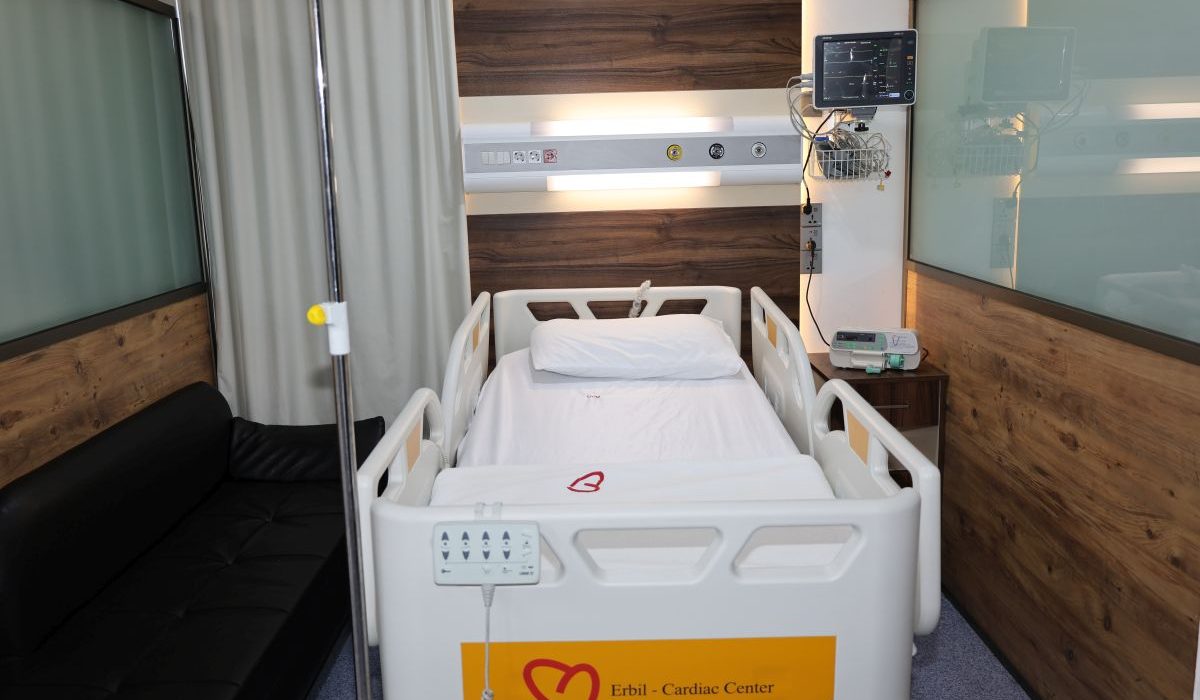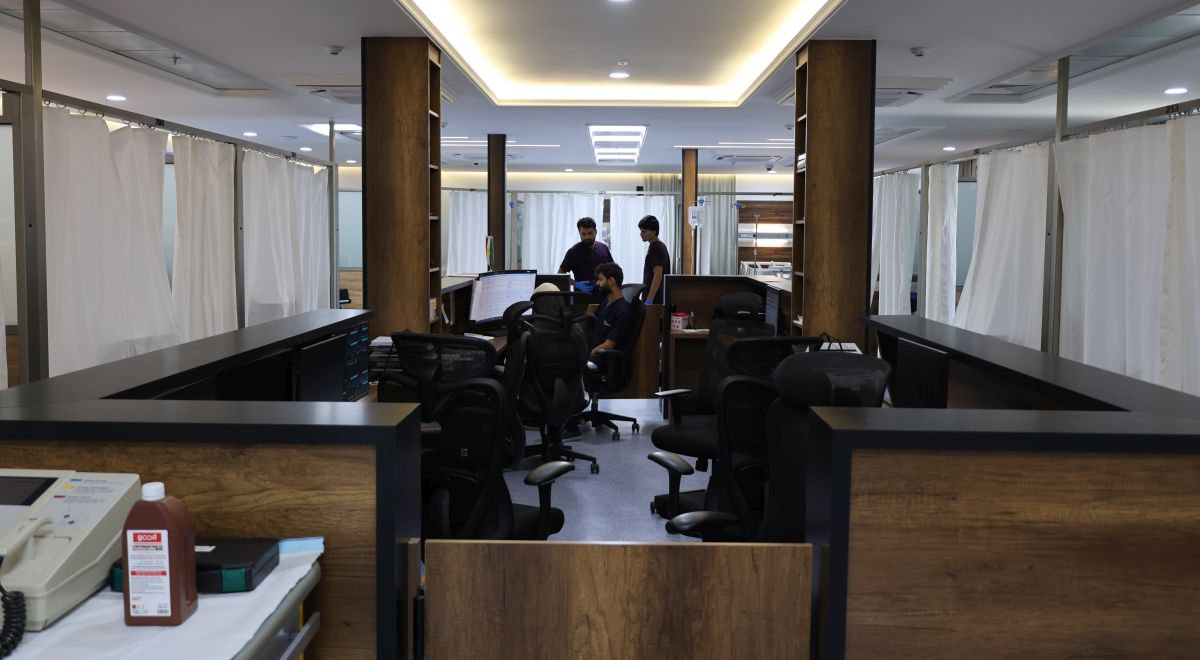About Us
The Adult Cardiology Department is dedicated to the comprehensive care of adult patients with heart and vascular conditions. Our experienced cardiologists offer expertise in diagnosing and managing a wide spectrum of diseases, from common issues like hypertension and high cholesterol to complex conditions such as advanced heart failure and congenital heart defects in adults. We are committed to providing individualized treatment plans utilizing the latest advancements in cardiovascular medicine to improve the health and well-being of our patients
Our Services Include:
* Comprehensive Cardiac Evaluations: Thorough assessments including physical exams, resting ECGs, echocardiograms, Ambulatory ECG monitoring (Holter study), implantable device interrogation and stress tests to diagnose various heart conditions.
* Interventional Cardiology: Minimally invasive procedures such as diagnostic coronary angiography, coronary angioplasty, diagnostic peripheral angiography and angioplasty and structural heart interventions performed in our 4-cardiac catheterization laboratories.
* Electrophysiology Studies: Diagnosis and treatment of heart rhythm disorders (arrhythmias) using advanced mapping systems and procedures like catheter ablation, cardiac resynchronization therapy and pacemaker/defibrillator implantation.
* Heart Failure Management: Comprehensive care for patients with heart failure, including medication management, lifestyle guidance, and advanced therapies.
* Preventive Cardiology: Strategies to identify and manage risk factors for cardiovascular disease through lifestyle modifications, medication, and education.
Cardiovascular diseases (CVDs) are a group of illnesses that affect your heart and blood vessels. These are the vital pathways that carry oxygen and nutrients throughout your body. When these pathways are compromised, it can lead to serious health problems.
Health Information
What are the main types of cardiovascular diseases (CVD)?
CVD is a broad term encompassing several conditions, including:
* Coronary Artery Disease (CAD): This is the most common type, where the arteries supplying blood to your heart become narrowed or blocked by plaque (fatty deposits). This can lead to chest pain (angina), heart attack, and heart failure.
* Heart Failure: A condition where the heart can’t pump enough blood to meet the body’s needs. This doesn’t mean the heart has stopped, but it’s working less effectively.
* Arrhythmias: Irregular heartbeats – the heart may beat too fast, too slow, or erratically. Some are harmless, but others can be dangerous.
* Valvular Heart Disease: Problems with the heart valves that control blood flow between the heart chambers. Valves may become stiff, leaky, or not close properly.
* Stroke: Happens when the blood supply to part of the brain is interrupted or severely reduced, depriving brain tissue of oxygen and nutrients.
* Congenital Heart Defects: Heart problems that are present at birth due to abnormal development of the heart’s structure.
* Peripheral Artery Disease (PAD): any disease of peripheral blood vessels that needs intervention. Narrowing of blood vessels outside the heart and brain, commonly affecting the legs.
* Aortic Disease: Conditions affecting the aorta, the large artery that carries oxygenated blood from the heart to the rest of the body, such as aneurysms (bulging) or dissection (tearing)
Education, Training & Accreditation
Our department plays a leading role in Cardiology education in the Kurdistan Region, Iraq, and across the Arab world. We are proud to be a recognized and accredited training center for:
– Kurdistan Board for Medical Specialties
– Iraqi Board of Medical Specializations
– Arab Board of Health Specializations
We are deeply committed to training and mentoring the next generation of surgeons, offering a structured academic environment, hands-on operative experience, and close supervision. Young doctors from across the region come to our center to gain the knowledge, skills, and qualifications necessary to become certified specialists in cardiac, thoracic, and vascular surgery.
Our academic efforts include:
– Cardiology residency and fellowship training
– Scientific seminars, case discussions, and academic rounds
– Collaboration with universities and health institutions
About us
The Pediatric Cardiology Department specializes in the diagnosis, treatment, and management of heart conditions in infants, children, and adolescents. Our team of specialized pediatric cardiologists provides comprehensive care for congenital heart defects, acquired heart diseases, arrhythmias, and other cardiovascular issues unique to young patients. We utilize child-friendly diagnostic tools and tailored treatment strategies, working closely with families to ensure the best possible cardiac health outcomes for their children.
Our team
The team includes specialized pediatric cardiologists and trainees who diagnose and manage a wide range of childhood heart conditions who perform specialized diagnostic tests like echocardiograms, cardiac caths both diagnostic such as cath for cardiac hemodynamics and interventional cath like defect closure and ballon dilatation . They are supported by skilled nurses with expertise in pediatric cardiac care. The team also often includes administrative staff who ensure smooth clinic operations. Together, this multidisciplinary team provides comprehensive and compassionate care tailored to the unique needs of children with heart disease.
Education, Training & Accreditation
Our department plays a leading role in surgical education in the Kurdistan Region, Iraq, and across the Arab world. We are proud to be a recognized and accredited training center for:
– Kurdistan Board for Medical Specialties
– Iraqi Board of Medical Specializations
– Arab Board of Health Specializations
We are deeply committed to training and mentoring the next generation of surgeons, offering a structured academic environment, hands-on operative experience, and close supervision. Young doctors from across the region come to our center to gain the knowledge, skills, and qualifications necessary to become certified specialists in cardiac, thoracic, and vascular surgery.
Our academic efforts include:
– Surgical residency and fellowship training
– Undergraduate medical student teaching
– Scientific seminars, case discussions, and academic rounds
– Collaboration with universities and health institutions
Health Information
Important Things to Know:
• Appointments: Please arrive on time for your scheduled appointments. If you need to reschedule, please let us know as soon as possible.
• Medications: If your child is prescribed medication, please follow the instructions carefully and ask us any questions you may have.
• Signs to Watch For: Contact us if your child experiences symptoms like:
o Trouble breathing or fast breathing
o Bluish skin, lips, or nails
o Poor feeding or weight gain
o Excessive tiredness
o Chest pain
o Fainting spells
• Your Role: As a parent or guardian, you are a vital part of your child’s care team. Please share any concerns you have and actively participate in their treatment plan.
We are here to support you and your child every step of the way. Please don’t hesitate to ask questions.
[1:58 pm, 22/06/2025] Dr_shaween: About Us
The Department of Cardiac, Thoracic, and Vascular Surgery at the Surgical Specialty Hospital is the leading center for advanced cardiovascular surgery in Iraq and the Kurdistan Region. Our department made history by performing the first-ever cardiac surgery in the Kurdistan Region in December 2007. Since then, we have evolved into the most renowned and respected cardiac center in Iraq and the surrounding region.
Our Services
We offer a comprehensive spectrum of surgical procedures, from simple to highly complex cases, for patients of all age groups—from neonates to the elderly—and across elective, urgent, and emergency scenarios.
Adult Cardiac Surgery:
– Coronary Artery Bypass Grafting (CABG)
– Valve Repair and Replacement
– Infective Endocarditis Surgery
– Cardiac Tumor Excision
– Aortic Surgery
– Device and Instrument Implantation
Pediatric Cardiac Surgery:
– Atrial Septal Defect (ASD)
– Ventricular Septal Defect (VSD)
– Tetralogy of Fallot (TOF)
– Patent Ductus Arteriosus (PDA)
– Blalock-Taussig (BT) Shunt
– Pulmonary Artery Banding (PA-Banding)
Thoracic and Vascular Surgery:
– Lung, mediastinal, and chest wall surgery
– Peripheral and central vascular procedures
Our Team & Volume
We are proud to have a team of 16 highly qualified surgeons, all with international experience, dedicated to providing patient-centered, evidence-based surgical care.
Each year, our department performs:
– More than 1,400 adult (acquired) cardiac surgeries
– Over 200 pediatric cardiac surgeries
Education, Training & Accreditation
Our department plays a leading role in surgical education in the Kurdistan Region, Iraq, and across the Arab world. We are proud to be a recognized and accredited training center for:
– Kurdistan Board for Medical Specialties
– Iraqi Board of Medical Specializations
– Arab Board of Health Specializations
We are deeply committed to training and mentoring the next generation of surgeons, offering a structured academic environment, hands-on operative experience, and close supervision. Young doctors from across the region come to our center to gain the knowledge, skills, and qualifications necessary to become certified specialists in cardiac, thoracic, and vascular surgery.
Our academic efforts include:
– Surgical residency and fellowship training
– Undergraduate medical student teaching
– Scientific seminars, case discussions, and academic rounds
– Collaboration with universities and health institutions
Our Commitment
With a strong foundation in experience, innovation, and education, we continue to lead the region in cardiac, thoracic, and vascular surgery. Our mission is to provide the highest standard of care, train future specialists, and advance cardiovascular medicine through excellence and dedication.
To ensure the best outcomes for complex and high-risk cases, we hold a weekly Heart Team Committee meeting, bringing together cardiac surgeons, cardiologists, intensivists, anesthesiologists, and radiologists. This multidisciplinary approach allows for shared decision-making and personalized treatment plans for our patients.
Adult Cardiology
About us
Our team of highly skilled interventional cardiologists utilizes leading age technology, including advanced cardiac catheterization labs, to diagnose and treat issues such as coronary artery disease, heart attacks performing both elective and emergency coronary intervention, valvular heart disease, and peripheral artery disease intervention. We are committed to delivering timely, effective, and patient-centered care, focusing on improving outcomes and enhancing the quality of life for individuals with cardiovascular ailments in the region
Our Team
Our team consists of highly qualified multidisciplinary team committed to providing exceptional cardiovascular care. Interventional cardiologists possess extensive experience in diagnosing and treating complex heart and vascular conditions. They are leaders in their field, continuously updating their knowledge and skills to ensure our patients benefit from the most advanced approaches.
Working closely with our physicians is a team of specialized nurses who are experts in cardiac care and interventional procedures. They provide compassionate and comprehensive support to our patients throughout their journey, from pre-procedure preparation to post-procedure recovery.
Our highly trained cardiac catheterization technologists play a crucial role during procedures, operating the advanced imaging equipment and assisting the cardiologists with precision and efficiency. Their technical expertise is vital to the success and safety of our interventions.
About us
The Echo Unit is an essential component of the cardiology department, employing ultrasound to generate comprehensive images of the heart. This non-invasive imaging technique enables doctors to evaluate the heart’s anatomy, its operational efficiency, and blood circulation, playing a crucial role in diagnosing and managing a wide range of heart diseases.
Our Team
The Echo Unit team is a focused group of Highly trained sonographers and cardiologists both specialists and trainees who expertly use ultrasound technology to capture detailed cardiac images. Their combined expertise allows for thorough evaluations of the heart’s anatomy, its functional performance, and blood circulation, providing essential diagnostic insights for numerous cardiac conditions and playing a vital role in guiding patient care within the cardiology service.
About us
The Emergency Unit for Acute Cardiac Care is a specialized area within the hospital dedicated to the immediate and critical management of patients experiencing severe heart-related emergencies. Equipped with advanced monitoring systems, life-support technology, and a rapid response team of cardiologists, and specialized nurses, this unit provides swift diagnosis and intervention for conditions such as heart attacks, life-threatening arrhythmias, acute heart failure, and cardiogenic shock. The primary goal is to stabilize patients, prevent further cardiac damage, and facilitate timely access to definitive treatments like angioplasty or surgery.
Our Team
The team is a multidisciplinary group providing critical care for severely ill heart patients. It includes Cardiologists (Attending & Fellows): These are the physicians leading the medical care.
* Attending Cardiologists: Provide overall medical direction, make high-level diagnostic and treatment decisions, and oversee the care plan. They are experts in acute coronary syndromes, heart failure, arrhythmias, and other critical cardiac conditions
* Cardiology Fellows (Residents): Physicians undergoing specialized training in cardiology. They work closely with attending cardiologists, managing patient care, performing procedures, and coordinating daily rounds.
* Nurses: They conduct patient assessments, order and interpret diagnostic tests, manage medications and contribute significantly to daily patient management and discharge planning.
About us
The Coronary Care Unit (CCU) is a critical, specialized area within the hospital focused on the intensive monitoring and treatment of patients experiencing severe cardiac events like heart attacks, unstable angina, and life-threatening arrhythmias. Outfitted with cutting-edge technology and managed by a team of highly trained nurses and cardiologists, the CCU provides continuous surveillance of vital functions, enabling swift and effective interventions to stabilize patients and enhance their recovery during these critical episodes
Our Team
Coronary Care Unit (CCU) teams are multidisciplinary groups of highly specialized healthcare professionals dedicated to the intensive care of patients with critical cardiac conditions. These teams typically include expert cardiologists and trainees who direct patient care, critical care nurses trained in advanced cardiac life support and monitoring, and may also involve physician assistants, nurse practitioners, pharmacists, respiratory therapists, and other specialists. Working collaboratively, the CCU team provides continuous monitoring, administers complex treatments, and makes rapid, informed decisions to stabilize patients and improve outcomes during life-threatening cardiac events.
Abou us
The Outpatient Cardiology Clinic provides comprehensive evaluation and management for a wide range of heart and vascular conditions in patients who do not require hospitalization. Our experienced cardiologists offer consultations, diagnostic testing (such as ECGs, echocardiograms, and stress tests), and personalized treatment plans to address issues like hypertension, chest pain, palpitations, heart failure, and high cholesterol. We focus on preventive care, early detection, and ongoing management to optimize cardiovascular health and improve the long-term well-being of our patients in a convenient outpatient setting.
Our Team
Our team includes experienced cardiologists who specialize in diagnosing and managing various heart and vascular conditions. Supporting them are skilled nurses who assist with patient care, conduct preliminary assessments, and provide patient education. Additionally, our administrative staff ensures efficient clinic operations, manages appointments, and handles patient inquiries, all working together to deliver high-quality and patient-centered cardiovascular care in an outpatient setting
About us
The Non-Invasive Holter and Stress ECG Tests Unit offers essential information about the heart’s electrical behavior both during normal activity and under stress. Holter monitors are small, wearable devices that continuously record heart rhythm over a longer duration, effectively capturing irregular heartbeats or other electrical issues that might be missed in a standard ECG. Stress ECG, performed while a patient exercises, assesses how the heart’s electrical activity responds to physical exertion, aiding in the detection of coronary artery disease and exercise-induced rhythm disturbances. These non-invasive assessments are vital for diagnosing and managing various cardiac conditions without the need for invasive procedures
Our Team
The team within the Non-Invasive Holter and Stress ECG Tests Unit is composed of skilled professionals dedicated to providing accurate and timely cardiac assessments. This typically includes cardiac technicians who are proficient in applying the Holter monitors, conducting stress ECG tests following established protocols, and ensuring patient comfort and safety during the procedures. Experienced cardiologists both specialists and trainees then interpret the recorded data from both Holter monitors and stress ECGs, providing crucial diagnostic information to guide patient management.
The collaborative expertise of the technicians and cardiologists ensures the effective operation of this unit and contributes significantly to the diagnosis and care of individuals with various cardiac concerns
Overview of Holter
A Holter monitor is a small, wearable device that records the heart’s rhythm. It’s used to detect or determine the risk of irregular heartbeats (arrhythmias).
A Holter monitor test may be done if a traditional electrocardiogram (ECG or EKG) doesn’t provide enough details about the heart’s condition. If the irregular heartbeats are infrequent, a longer-term monitor called an event recorder may be needed.
Some personal devices, such as smartwatches, offer electrocardiogram monitoring. Ask your health care provider if this is an option for you.
Why Holter monitoring it’s done?
A health care provider may recommend a Holter monitor if you have:
Signs and symptoms of an irregular heart rhythm (arrhythmia)
Unexplained fainting
A heart condition that increases the risk of arrhythmias
Before you get a Holter monitor, you’ll have an electrocardiogram (ECG or EKG). An ECG is a quick and painless test that uses sensors (electrodes) taped to the chest to check the heart’s rhythm.
If you have infrequent arrhythmias, an ECG may not detect them. A Holter monitor may be able to spot irregular heart rhythms that an ECG missed.
If standard Holter monitoring doesn’t capture an irregular heartbeat, a device called an event monitor may be recommended to record heartbeats over several weeks
About us
Our department features a state-of-the-art electrophysiology laboratory. This advanced lab is equipped with a cutting-edge digital coronarography-angiography system and innovative 3D mapping technology, enabling real-time visualization of the heart’s structure and local electrical activity.
Our specialized and experienced interventional electrophysiologist performs a spectrum of electrophysiology procedures and pacing in this laboratory. This includes:
* Comprehensive electrophysiology studies.
* Implantation of all types of pacemakers, Left bundle pacing, intra cardiac defibrillators and CRT-Ds
* Replacement of all previously implanted devices.
We are performing more than 300 EP and ablations, and implanting more than 250 cardiac devices per year.
Our team
The Electrophysiology Team, integral to the Electrophysiology Department, comprises a dedicated group of skilled healthcare professionals – including physicians, nurses, allied health experts, and administrative personnel – specializing in the evaluation of heart rhythms
Health information
Heart rhythm problems, or arrhythmias, mean your heart beats too fast, too slow, or irregularly due to electrical issues. You might feel palpitations, dizziness, or shortness of breath, but sometimes there are no symptoms. While some are harmless, others can be serious, increasing risks like stroke. Doctors use tests like ECGs to diagnose arrhythmias, and treatments range from medication to procedures or devices to regulate your heartbeat. If you notice unusual heartbeats, see your doctor to ensure your heart stays healthy.


